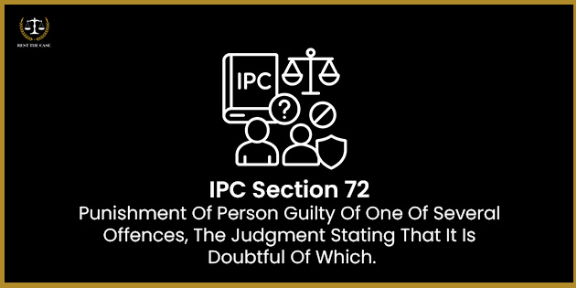IPC
IPC Section 72 - Punishment Of Person Guilty Of One Of Several Offences, Judgment Stating That It Is Doubtful Of Which

In criminal trials, it is not uncommon for evidence to suggest that the accused has committed an offence, but there may be uncertainty about which specific offence the act constitutes. To deal with such situations, the Indian Penal Code provides clarity through Section 72 (now replaced by Section 10 of the Bharatiya Nyaya Sanhita), ensuring that the accused is not over-punished when there is doubt between multiple possible offences.
We will cover in this blog:
- The legal text and meaning of IPC Section 72
- Simplified explanation of how it works
- Practical examples
- Judicial interpretation with case law
- Its modern-day relevance
- Common FAQs
Legal Text of IPC Section 72
Section 72. Punishment of a person guilty of one of several offences, the judgment stating that it is doubtful of which.
“In the case of an act or omission which is punishable under two or more sections of this Code, and if it is doubtful under which of those sections the offence falls, the offender shall be punished under either of those sections, but not with the punishment of any other section.”
Simplified Explanation
This provision ensures that if an act appears to fall under multiple possible offences, but there is a reasonable doubt as to which specific offence has been committed, the accused will:
- Still be punished, but only under one section.
- Not be subjected to punishment under all possible sections.
- Receive punishment not exceeding the lowest prescribed punishment among the doubtful offences.
This protects the accused from harsher penalties when the exact categorisation of the offence cannot be determined.
Practical Example
Suppose a person strikes another with a stick. Evidence shows that the victim suffered injuries, but it is unclear whether the injuries amount to “hurt” (Section 323 IPC) or “grievous hurt” (Section 325 IPC).
- If the court finds it doubtful whether it is hurt or grievous hurt, then under Section 72, the offender can be punished for either offence, but not both.
- More importantly, the punishment awarded cannot exceed the lower punishment prescribed between the two.
This ensures fairness and prevents double punishment.
Purpose of IPC Section 72
- Prevents excessive punishment when evidence is unclear.
- Ensures fairness in sentencing, especially when offences overlap.
- Protects the accused’s constitutional right against double jeopardy (Article 20(2)).
- Gives courts discretion while ensuring punishment remains proportionate.
Judicial Interpretation
Courts have clarified the use of Section 72 IPC in several cases:
Omkarnath v. State of Madhya Pradesh, AIR 1964 SC 1295
- Facts: The accused was charged with multiple offences relating to falsification of accounts and breach of trust. There was uncertainty as to which precise section applied.
- Held: In the case of Omkarnath v. State of Madhya Pradesh, AIR 1964 Supreme Court observed that when there is doubt about the offence, punishment must not exceed the minimum prescribed, and the accused must not be penalised under more than one section.
State of Maharashtra v. Joseph Mingel Koli (1997) 2 SCC 386
- Facts: The accused was convicted of multiple offences arising out of the same act, but there was ambiguity about which provision applied.
- Held: In the case of State of Maharashtra v. Joseph Mingel Koli (1997) Court held that Section 72 acts as a safeguard, when doubt exists, only one punishment can be awarded, not cumulative punishments.
Modern-Day Relevance
Section 72 is particularly relevant in:
- Cybercrime cases where the same act may fall under different IT Act and IPC provisions.
- Financial fraud cases where cheating, forgery, and breach of trust overlap.
- Assault and injury cases where the degree of harm is disputed.
In today’s complex criminal cases, this section ensures fair sentencing without undue harshness when the precise nature of the offence cannot be clearly established.
Conclusion
IPC Section 72 plays a vital role in protecting accused persons from overlapping or excessive punishment when the exact offence is in doubt. It ensures that justice is administered fairly by limiting punishment to one section and not exceeding the lowest prescribed penalty. By doing so, it balances the rights of the accused with the need for accountability.
Frequently Asked Questions
Q1. Does Section 72 mean the offender goes unpunished if the offence is doubtful?
No, the offender will still be punished, but only under one section and not beyond the minimum punishment.
Q2. Can courts impose cumulative punishments under Section 72?
No, section 72 prohibits multiple punishments when doubt exists about which offence was committed.
Q3. How is Section 72 different from Section 71?
(a) Section 71 deals with cases where one act amounts to several offences. (b) Section 72 deals with cases where it is doubtful which offence has been committed.
Q4. Is Section 72 relevant in cybercrime or economic offences?
Yes, many modern crimes overlap under different provisions. Section 72 ensures fair sentencing when ambiguity exists.






